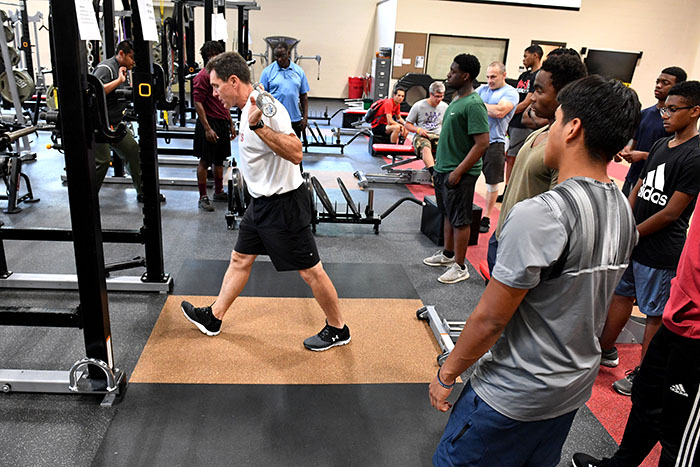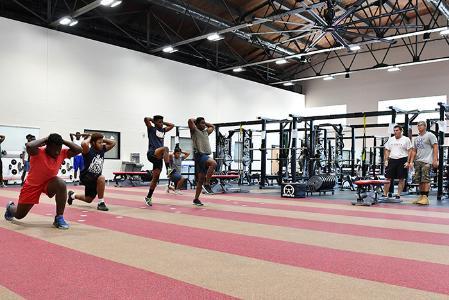Psychology Professors Investigate the Success of College Orientation Workshop

Participants in the College Orientation Workshop (COW) program work on their physical fitness in Cormack Hall.—VMI Photo by Kelly Nye.
For more than three decades, the College Orientation Workshop (COW), a program meant to encourage high school-age minority males to attend college, has been held on the VMI post each summer, though it is not affiliated with the Institute. Led by Gene Williams ’74, the first African-American to serve on the VMI Board of Visitors, the program consists of four weeks of mental and physical challenges in a structured environment.
There’s plenty of anecdotal evidence COW boosts achievement. Many former participants have gone on to earn college degrees, some from VMI, and the program is supported by donations alone, many from COW alumni and their families. But does COW have a measurable effect on participants’ future achievement?
Up until recently, no one had researched to find out. But for the past three years, three members of the psychology department faculty—Col. Scott Frein, Col. Keith Kline, and Maj. Sara Whipple—have joined forces to study COW participants and attempt to quantify the impact of the program.
The idea to study COW came about as Frein and Kline were talking about how they wanted their research to have a more applied focus, as opposed to being purely theoretical. When they decided to investigate the COW program, they invited Whipple to join them, as her specialty is developmental psychology.
In the summer of 2017, the three professors asked COW participants to take pre- and post-tests in which they answered questions having to do with how they felt about themselves.
“The first year we kind of considered it a pilot project—get a better feel for what the program is about and how we could be involved in it,” said Frein.
“So really, we were looking at the effects of the COW program on psychological and then later physical well-being,” added Kline.
The next year, COW participants were once again asked to take pre- and post-tests designed to measure factors such as self-esteem, self-efficacy, life satisfaction, and more. This time, though, the researchers added physical health measurements such as blood pressure and heart rate, both measured at the beginning and the end of the program.
Kline explained that when the program began, the mean systolic (upper number) blood pressure reading for COW participants was near the upper end of normal for adults. Four weeks later, at the end of the program, it had fallen to the normal range for adolescents.
“We saw significant decreases in blood pressure and heart rate from pre to post,” said Kline, who studies health psychology, or the influence of mental health on physical health.
It would be easy to speculate that increased physical fitness through COW’s plentiful opportunities for sit-ups and running would be the reason for the decreases in blood pressure and heart rate, but Kline was quick to note that the data didn’t support that correlation.
 “Their fitness scores were not correlated with their blood pressure and heart rate reductions, but some of the psychological variables were,” he stated.
“Their fitness scores were not correlated with their blood pressure and heart rate reductions, but some of the psychological variables were,” he stated.
Coming into the current year, the trio of researchers decided to measure the same variables, but also attempt to answer another question—what is the long-term effect of COW participation?
To find out, the three went online to find a control group of young men who had not been through COW. They then arranged for all of the study participants, both COW, and non-COW, to take follow-up psychological assessments at the three-month, six-month, and one-year marks, with gift cards offered as a reward for survey completion.
“What we’re trying to do with the year-three program is, here are the COW participants and we’re seeing these changes,” explained Frein. “Here’s another group who did not do the COW program. Are we seeing any changes in them?”
But the three professors haven’t been just using the COW participants as guinea pigs in an experiment. They’ve also made an effort to help them build skills that can lead to healthier responses to stress in an unpredictable world.
“[Williams] has been wonderfully supportive of the research and has even invited us to create some workshops for the young men,” explained Whipple.
The workshops, centering on topics such as willpower, self-control, and emotional regulation, have all been taught by Frein, who strives to let participants know that they have more control over their lives than they might think.
“We can’t control what other people do, but we can control how we think,” Frein commented. “Events happen, but we can choose how we react to those events.”
For his part, Williams is grateful to the psychology professors for all they’ve done to support COW. “By helping the [participants] understand how they can better harness their willpower, they can make far better decisions,” Williams commented. “That alone is worth far more than a pound of gold.”
Plans call for Frein, Kline, and Whipple to continue to work with COW participants each summer. They’ve also presented the results of their research at two conferences and have submitted a paper about their work to a peer-reviewed journal.
- By Mary Price
.svg)
.png)